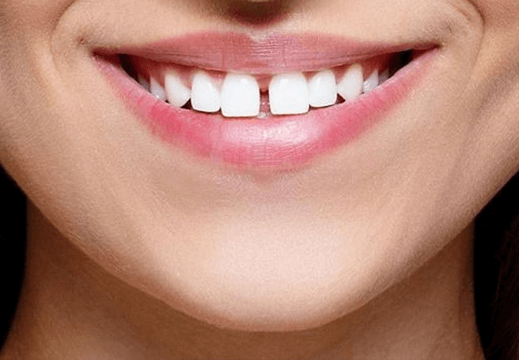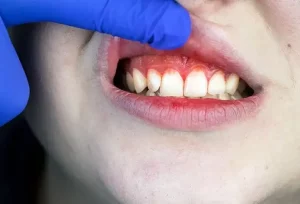Diastema is a disorder characterized by a visible gap between the teeth of more than 0.5 millimeters. Although diastema most usually affects the front teeth, it can also affect the rear teeth. Until the permanent teeth erupt, a diastema is fairly frequent in children. It can be addressed for cosmetic or practical reasons when it occurs in permanent teeth. In this article, we will provide you with general information about diastema.
Causes of Diastema
There are various variables that may contribute to the development of a diastema, including: 2 Teeth that are too tiny for the lower jawbone or the upper jawbone, causing gaps between them.
A mandible (jaw) that is overly large, causing the teeth to be misaligned (because there is too much space, causing gaps). Because the size of a person’s teeth and jawbones is determined by heredity and can run in families, hereditary factors come into play. The frenum (the skin between the upper lip and the front teeth) grows too long, causing a gap (diastema) between the two front teeth. Periodontitis (severe gum disease caused by poor dental hygiene) can result in jaw bone loss, which allows the teeth to move and create gaps. Periodontitis is characterized by red, swollen, bleeding gums, loose teeth, and bone loss.
Peg lateral is a disorder in which the tooth next to the very front two teeth grows incorrectly. Resulting in a little, pointed tooth that causes gaps on both sides. Crowns, veneers, or implants can be used to correct a peg lateral.
Thumb sucking is one of the common causes of diastema in the gap between two central teeth. Tongue thrusting creates lower jaw diastemas by forcing the tongue on the two central lower teeth.
Diagnoses of Diastema
Diastema can be diagnosed by a dentist after the oral examination. Keep in mind that children commonly have gaps in their teeth that don’t require treatment. Getting diastema treatment can help a person’s self-esteem go higher. In fact, a study found that among young people who had a correction of midline diastema. 50% of the people who had coreection of midline diastema, reported that the procedure significantly improved their quality of life.
Fixing the gaps between the teeth can boost a person’s self-esteem while also restoring the tooth’s regular functioning. Misalignment of the teeth can be caused by any form of space. Biting and chewing issues may arise as a result. This can affect a person’s ability to consume and digest food effectively, which can have a negative influence on their overall health. The correct anatomy of the mouth is restored by filling the spaces between the teeth.
Treatment of Diastema
You might decide not to have restorative or orthodontic treatment to close the gap between your teeth. However, bear in mind that every time there are gaps between your teeth, extra oral hygiene may be required. This is due to the fact that food frequently becomes stuck. To make cleaning between the teeth simpler, some experts advocate using a water flosser.
For the most part, diastema correction is a simple and painless procedure. There are various treatment options for closing gaps in the teeth. In fact, each person’s condition is unique, and the dental care practitioner will devise a treatment plan based on a variety of criteria.
Depending on the individual’s circumstances, the dentist will devise a treatment strategy for diastema. The dentist will next go over the various treatment choices with the patient, including the advantages and downsides of each.
Braces can be used to reposition teeth and reduce gaps; big gaps are usually treated with braces. After all of the adult teeth have erupted, braces are the only alternative.
Diastasis can be treated with veneers or composite bonding. A layer of material (such as porcelain or composite material) is put over the tooth in veneers and composite bonding. A composite material is a substance made up of two or more components having chemical characteristics that are considerably different. When these materials are mixed together, they solidify into a hard, tooth-like substance. Veneers and composite bonding work well when just one or two gaps need to be filled.
Composite bonding/veneers involve a dentist-made synthetic substance that is fitted over the tooth. Because the dentist produces the composite and gives it the proper form and look. The process normally does not require a second appointment. A composite veneer is when composite material is used to cover the whole tooth. Because the lab is not involved in the creation of the veneer in either case, the procedure normally only requires one visit.
Bridges or crowns are another treatment option for diastema. Crowns are a good alternative for filling wide gaps or repairing a tooth that is cracked, chipped, or otherwise damaged. When teeth are lost, dental bridges can be employed. Crowns and bridges can assist in the restoration of correct bite and chewing function.
All in all, there are various treatment options for diastema. You can fix your teeth at Smile Team Turkey as we have experienced staff for dental veneers and dental crowns. You can get a full smile makeover at budget-friendly prices.
You can read our previous post on https://smileteamturkey.com/blog/why-is-turkey-number-one-in-hair-transplantation/






